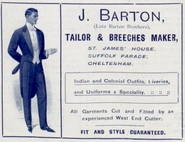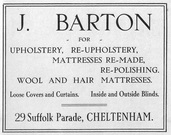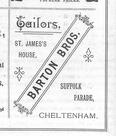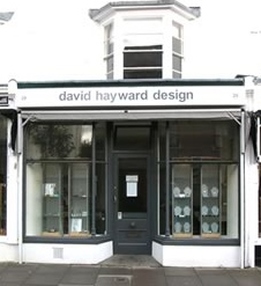The Suffolks │25 previous / next │main map / suffolks map
29 Suffolk Parade (formerly 13 Suffolk Parade South)
John Delabere sold the land upon which Suffolk Parade was later created to Henry Thompson, the developer of Montpellier, in 1807. The street was laid out in the next few years and in 1818 the site of modern house numbers 28-31 was leased to Mr Aaron Wills Gay, a carpenter and joiner. Then, in 1822, following the death of Henry Thompson, his sons sold this land, with a frontage of 60 feet and a depth of 92 feet, to Mr Gay. It is probable that he developed the 4 properties on the site and leased them out, having acquired a further plot at the rear of the premises in 1826. Suffolk Parade was unnamed at that time and is referred to in title deeds as a "private road".
Aaron Wills Gay died in 1844 and all 4 properties in this row were advertised to be auctioned at the Suffolk Arms Inn. However they were eventually all acquired by private treaty by Mr John Lapidge, the former grocer at 34 Suffolk Parade, who died here in 1872. In 1868 these premises came to be associated with the clothing, cloth and fabric-retailing trade for more than one hundred years, firstly as Mrs Claridge's dressmaking business, then Thomas Willis drapers, Barton Brothers tailors, owned by Joseph and William Barton, Frederick Vick costumiers and finally Bruce Joyner.
 1913 1913
Joseph Barton (senior) took over the business in the first few years of the 20th century. He was active in local civic life and in 1906 was the Honorary Treasurer of the Leckhampton Hill Defence Fund, which was established to support the 8 men tried at Gloucester for the civil unrest that ensued after the new owners of the hill closed some of the public footpaths. Mr Barton lived with his wife, Annie Louise, at 25 Suffolk Parade. He died on 4th November 1912.
 1926 1926
By 1910 the business had transferred to their son, Joseph Barton (junior), who established a furniture upholstery shop here and also manufactured curtains and blinds. He ceased trading in the late 1930s and this shop then became a ladies costumier owned by Frederick Vick. In 1949 this became Bruce Joyner, costumier, and remained a ladies fashion shop until 1977.
Since 2000 it has been home to David Hayward Design, makers of fine writing instruments. Researcher: Stuart Manton
|
David Hayward Design
|
If you have any further information or photographs of this property please let us know via the contacts page.


